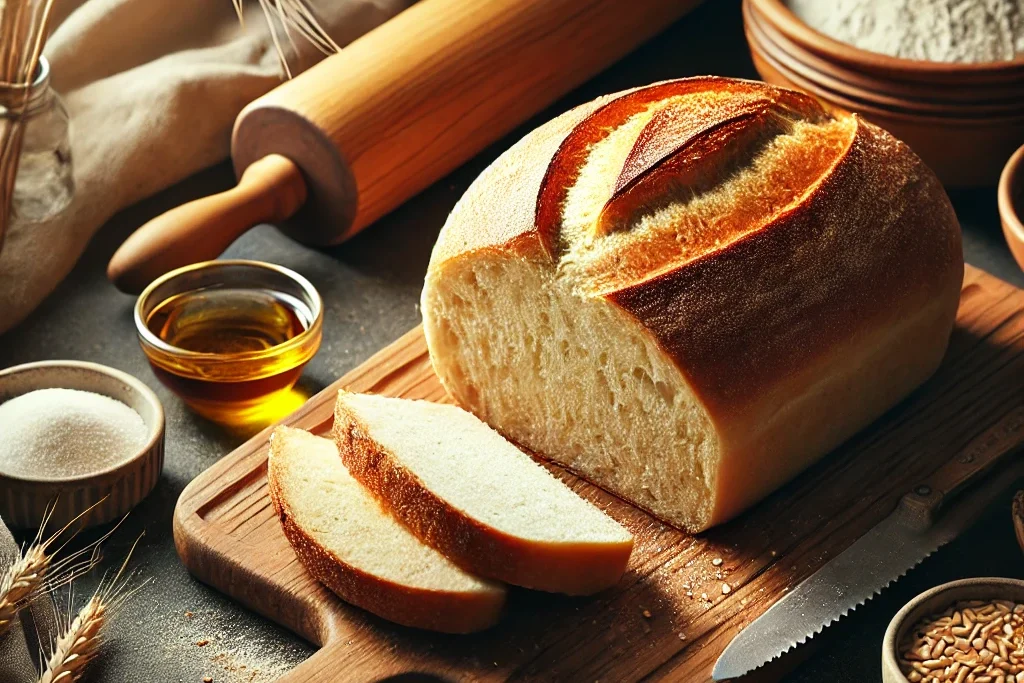Introduction
Have you ever wondered why the aroma of freshly baked bread feels so comforting and wholesome? It’s not just nostalgia at work; it’s a sign of purity and simplicity. In a world where convenience often takes precedence over quality, store-bought bread might seem like an easy choice. But have you ever paused to consider what’s really inside that neatly packaged loaf? From artificial preservatives to hidden sugars, store-bought bread often falls short when it comes to health and nutrition.
Homemade bread, on the other hand, offers a level of control, freshness, and nutritional value that simply can’t be matched by its commercial counterpart. In this comprehensive guide, we’ll explore why homemade bread is healthier than store-bought, delving into its ingredients, preparation process, and overall impact on your health and well-being.
1. Homemade Bread Contains Fewer Ingredients
One of the most significant advantages of homemade bread is its simplicity. At its core, bread requires only four basic ingredients: flour, water, yeast, and salt. Compare this to the lengthy ingredient lists found on most store-bought bread packages, which often include:
- High-fructose corn syrup
- Artificial preservatives
- Emulsifiers and stabilizers
- Bleached or enriched flours
These additives are used to extend shelf life and improve texture, but they can negatively impact your health over time. By making your bread at home, you have full control over what goes into it, ensuring that every slice is free of unnecessary chemicals.
2. Homemade Bread Is Free From Harmful Preservatives
Commercial bakeries rely heavily on preservatives to keep bread soft and mold-free for weeks. While this may be convenient, it’s far from natural. Common preservatives like calcium propionate and sorbic acid have been linked to potential health issues, including headaches and digestive problems.
When you bake bread at home, you eliminate the need for these additives. Freshly baked bread, while having a shorter shelf life, is free from preservatives and is as natural as bread gets. You can even experiment with natural preservation methods, like using sourdough starters, which have natural antibacterial properties.
3. Homemade Bread Offers Better Nutritional Value
Store-bought bread often sacrifices nutritional quality for profit margins. Many commercial breads are made with refined flours that strip away essential nutrients, such as fiber, vitamins, and minerals. These breads are then “enriched” with synthetic nutrients to compensate for the loss, but they still fall short of the real thing.
When you bake your own bread, you can choose nutrient-dense ingredients, such as whole grain flours, seeds, and nuts. You can also experiment with adding superfoods like chia seeds, flaxseeds, or even turmeric for an extra health boost.
4. Homemade Bread Can Be Customized to Your Dietary Needs
Whether you’re gluten-free, vegan, or following a low-carb diet, homemade bread allows you to tailor recipes to suit your specific needs. Store-bought options are often limited and may contain allergens or ingredients you’d prefer to avoid.
By baking at home, you have the flexibility to:
- Use alternative flours like almond, coconut, or buckwheat
- Control sugar and sodium levels
- Avoid dairy, eggs, or other common allergens
This level of customization ensures that your bread aligns perfectly with your dietary goals.
5. Homemade Bread Supports Gut Health
Did you know that traditional bread-making methods, like sourdough fermentation, can benefit your gut health? Fermented breads are rich in probiotics, which promote healthy digestion and a balanced microbiome. Unfortunately, most store-bought breads are mass-produced using quick-rise methods that skip this beneficial fermentation process.
When you bake your own bread, you can embrace slower, more natural techniques that enhance both flavor and nutritional value. Sourdough starters, for example, not only improve digestibility but also help your body absorb more nutrients from the bread.
6. Homemade Bread Reduces Exposure to Hidden Sugars
Sugar is a sneaky ingredient in many store-bought breads, even in those labeled as “healthy” or “whole grain.” Added sugars can contribute to a range of health issues, including weight gain, insulin resistance, and inflammation.
When you bake at home, you have full control over the sweetness of your bread. Many homemade recipes require little to no sugar, making it easier to stick to a balanced diet.
7. Homemade Bread Tastes Better and Is More Satisfying
There’s no denying that the taste of freshly baked bread is far superior to store-bought options. The aroma, texture, and flavor of homemade bread make it a far more satisfying experience. Plus, the act of baking itself can be incredibly therapeutic and rewarding.
Store-bought bread often contains dough conditioners and artificial flavors to mimic the qualities of freshly baked bread, but these additives can’t replicate the genuine article. When you bake at home, every loaf is a testament to your effort and creativity.
8. Baking Bread at Home Is Cost-Effective
While the initial investment in baking equipment and ingredients might seem high, making bread at home is more cost-effective in the long run. A single loaf of artisan bread from the store can cost upwards of $5, whereas homemade bread often costs just a fraction of that.
Additionally, homemade bread reduces waste since you can bake only what you need, avoiding the common issue of half-eaten loaves going stale in the pantry.
9. Homemade Bread Encourages a Sustainable Lifestyle
By baking your own bread, you contribute to a more sustainable lifestyle. Store-bought bread often comes with excessive packaging, much of which is non-recyclable. Baking at home eliminates this waste and allows you to source ingredients locally, reducing your carbon footprint.
Moreover, homemade bread encourages mindfulness and a connection to the food you consume, fostering a deeper appreciation for sustainable practices.
Conclusion
Making the switch to homemade bread is a simple yet profound way to improve your health and lifestyle. From fewer ingredients and better nutrition to enhanced taste and sustainability, the benefits are undeniable. By taking control of what goes into your bread, you’re not just feeding your body but also nourishing your mind and soul.
So why settle for store-bought when you can experience the joy and rewards of baking your own? Embrace the art of bread-making, and discover how this timeless tradition can transform your meals and your well-being. Your journey to healthier, tastier bread begins today!

Thayná Alves is an influential digital content creator who has carved out a significant space in the realms of technology, finance, and entrepreneurship. Through her blog, Newbacker.com , she stands out as an authentic and accessible voice for individuals seeking practical information about investments, innovation, and emerging trends in the financial market.
